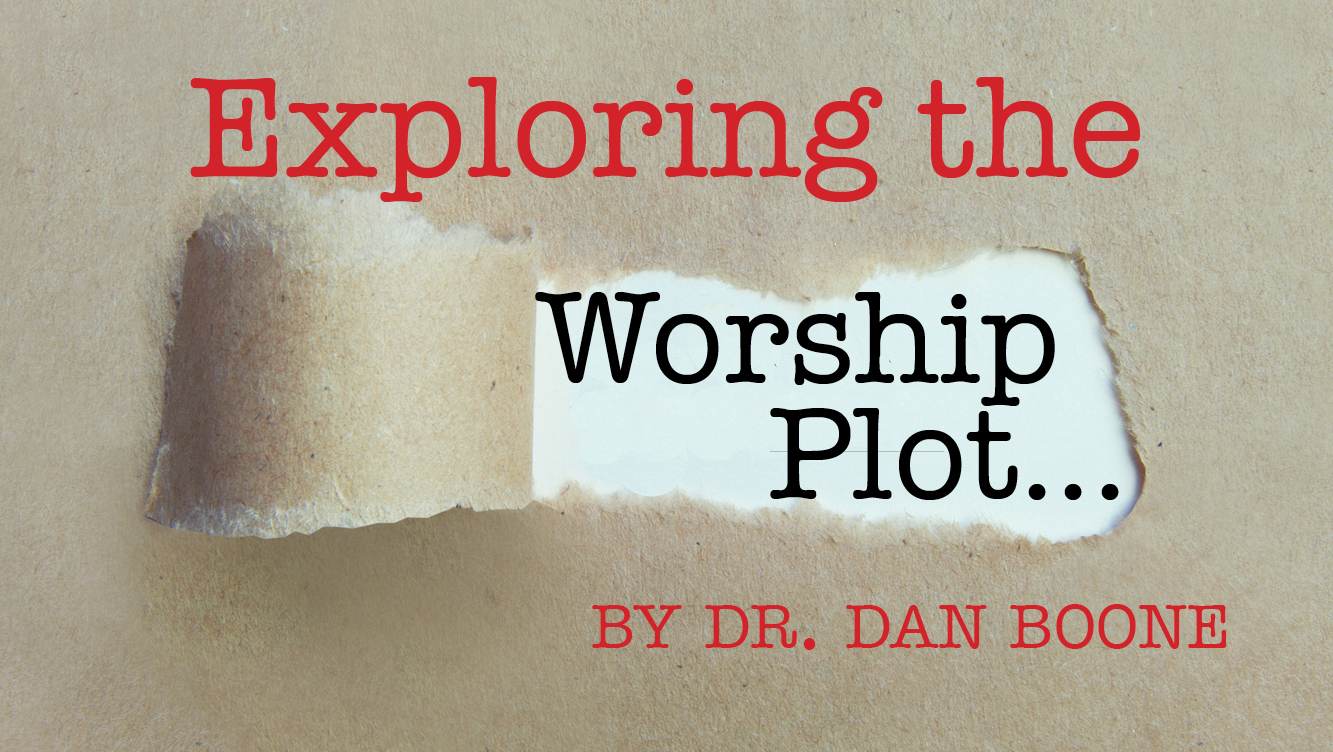 By Dr. Dan Boone
By Dr. Dan Boone
I love spontaneous moments in response to the Spirit of God. But I also think it is important for us to listen to the story of our creative God. In the Beginning, the Spirit hovered over a dark, formless chaos. Then God went to work. The Result was order, structure, and story. The order did not confine God; it unleashed God. The structure did not inhibit God; it revealed God. The story did not limit God; it narrated God.
In worship, the creating Spirit of God is at work sustaining the life of a people. The structure of worship is conducive to life in the Spirit. The story of God and humans is being told and acted out, much like a play combines words and actions to produce compelling drama.
In my book, The Worship Plot, I suggest five acts for the drama of worship:
- Entrance. A play starts with an exposition that sets the time and place of the story. The Entrance does something similar for worship. The opening act of the worship plot locates us. We gather at a certain time—on Sundays—because God has called us together. We enter a certain space—God’s presence. Gathering reminds us who we are and whose we are. This Sabbath pattern is our distinguishing habit.
- The Bad News. Just as a first act in a play raises a conflict that intensifies during the second, so goes the unfolding of the worship plot. If it really sinks in that we are gathered in the presence of the Holy God, we instantly identify with Isaiah: “I am ruined! For I am a man of unclean lips, and I live among a people of unclean lips, and my eyes have seen the King, the Lord Almighty” (Isa. 6:5, NIV). That’s another way of saying, “What’s a person like me doing in a place like this?” This leads to Act II of our drama, confession of the Bad News, the admission that our lives aren’t all we hope they would be, or all that God has desired for us.
- The Good News. This is the climax of our drama, the turning point for the better—the Good News. The Bible is full of good news. “I have heard your cry.” “And the father ran out to meet him.” “Get up. Take your mat. Go home” (see Exod. 3; Luke 15; Matt. 9). Every one of these statements is made to people living with bad news. Good news can be delivered as scripture, sermon or song. It is the moment in the service when we declare to troubled people that God is with us doing something redemptive. It is the story of Father, Son, and Spirit acting in loving aggressiveness toward troubled humans. We grow numb under worship that drones on and on about sin in a dark world. The worship plot must get for Bad News to Good News, from sin to grace, from death to life.
- Response of the People. The Good News opens us and makes us capable of response. Like the falling action in the fourth act of a play, our response to the Good News should draw us to an outcome where we are better off than we were before. The Good News even suggests what our response might be. The possibilities are many: repent of sin, be baptized, sing a song, give money, volunteer to serve, dedicate an infant, share the Lord’s Supper, testify, offer words of encouragement to fellow worshipers, be silent, break bread. These are real, bodily responses to the Good News. We believe that hearing is not enough; we must do something.
- Blessing. Another world for blessing is benediction, which means “to say good words.” This act of the worship plot takes only a minute or two, but it is the needed conclusion. It’s the denouement of the drama, where we hear that we are better off than we were. A pastor lifts his or her hands and pronounces blessings on the people who have gathered in God’s presence, been honest about their Bad News, received the Good News, and responded to grace. These people are now ready to be sent into the world where Jesus has already gone. They will serve the people of the world, empowered by the grace they have received. This closing blessing is a gift. It gives boldness to the beaten-down. It whispers grace to the weak. It invades our damaged self-esteem with words that say God values us. The grace of the Lord Jesus, the love of God, and the communion of the Holy Spirit go with us all.
Style divides. Story makes us one.
Click here to view Dr. Boone teaching an extended session on this topic.
.jpg?width=139&name=1L9A4034%20Boone%20summer%202019%20(1).jpg)
Having served in pastoral ministry for more than 30 years, Dr. Dan Boone became the eleventh president of Trevecca Nazarene University in Nashville, Tennessee, in 2005. A 1974 graduate of Trevecca, he earned a master’s degree from Nazarene Theological Seminary in 1977 and a doctorate in ministry from McCormick Theological Seminary in 1996. He began his pastoral ministry when he was in high school, and his last pastorate was at the College Church in Bourbonnais, Illinois. Dan has taught on the university and seminary level and also has been an instructor for the Salvation Army. Dan has been married to his college sweetheart, Denise, for 40 years, and they have three married daughters and six grandkids. Dan and Denise live in Franklin, Tenn.
Learn more about the book or get your own copy.











